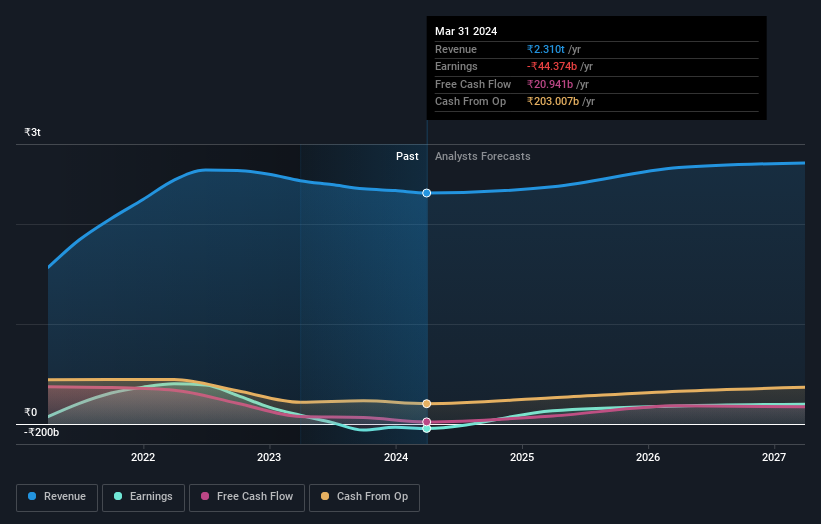- India
- /
- Metals and Mining
- /
- NSEI:TATASTEEL
Tata Steel Limited Just Missed Earnings; Here's What Analysts Are Forecasting Now

Shareholders might have noticed that Tata Steel Limited (NSE:TATASTEEL) filed its full-year result this time last week. The early response was not positive, with shares down 4.4% to ₹167 in the past week. Revenues came in at ₹2.3t, in line with estimates, while Tata Steel reported a statutory loss of ₹3.62 per share, well short of prior analyst forecasts for a profit. Earnings are an important time for investors, as they can track a company's performance, look at what the analysts are forecasting for next year, and see if there's been a change in sentiment towards the company. We thought readers would find it interesting to see the analysts latest (statutory) post-earnings forecasts for next year.
View our latest analysis for Tata Steel

Taking into account the latest results, the current consensus from Tata Steel's 25 analysts is for revenues of ₹2.37t in 2025. This would reflect a credible 2.7% increase on its revenue over the past 12 months. In the lead-up to this report, the analysts had been modelling revenues of ₹2.37t and earnings per share (EPS) of ₹10.67 in 2025. So we can see that while the consensus made no real change to its revenue estimates, it also no longer provides an earnings per share estimate. This suggests that revenues are what the market is focusing on after the latest results.
The average price target rose 8.1% to ₹162, with the analysts clearly having become more optimistic about Tata Steel'sprospects following these results. There's another way to think about price targets though, and that's to look at the range of price targets put forward by analysts, because a wide range of estimates could suggest a diverse view on possible outcomes for the business. There are some variant perceptions on Tata Steel, with the most bullish analyst valuing it at ₹210 and the most bearish at ₹125 per share. There are definitely some different views on the stock, but the range of estimates is not wide enough as to imply that the situation is unforecastable, in our view.
Of course, another way to look at these forecasts is to place them into context against the industry itself. It's pretty clear that there is an expectation that Tata Steel's revenue growth will slow down substantially, with revenues to the end of 2025 expected to display 2.7% growth on an annualised basis. This is compared to a historical growth rate of 13% over the past five years. By way of comparison, the other companies in this industry with analyst coverage are forecast to grow their revenue at 10% per year. So it's pretty clear that, while revenue growth is expected to slow down, the wider industry is also expected to grow faster than Tata Steel.
The Bottom Line
The clear take away from these updates is that the analysts made no change to their revenue estimates for next year, with the business apparently performing in line with their models. On the plus side, there were no major changes to revenue estimates; although forecasts imply they will perform worse than the wider industry. There was also a nice increase in the price target, with the analysts clearly feeling that the intrinsic value of the business is improving.
At least one of Tata Steel's 25 analysts has provided estimates out to 2027, which can be seen for free on our platform here.
Even so, be aware that Tata Steel is showing 3 warning signs in our investment analysis , and 1 of those makes us a bit uncomfortable...
Valuation is complex, but we're here to simplify it.
Discover if Tata Steel might be undervalued or overvalued with our detailed analysis, featuring fair value estimates, potential risks, dividends, insider trades, and its financial condition.
Access Free AnalysisHave feedback on this article? Concerned about the content? Get in touch with us directly. Alternatively, email editorial-team (at) simplywallst.com.
This article by Simply Wall St is general in nature. We provide commentary based on historical data and analyst forecasts only using an unbiased methodology and our articles are not intended to be financial advice. It does not constitute a recommendation to buy or sell any stock, and does not take account of your objectives, or your financial situation. We aim to bring you long-term focused analysis driven by fundamental data. Note that our analysis may not factor in the latest price-sensitive company announcements or qualitative material. Simply Wall St has no position in any stocks mentioned.
About NSEI:TATASTEEL
Tata Steel
Engages in the manufacture and distribution of steel products in India and internationally.
Average dividend payer with moderate growth potential.
Similar Companies
Market Insights
Community Narratives




